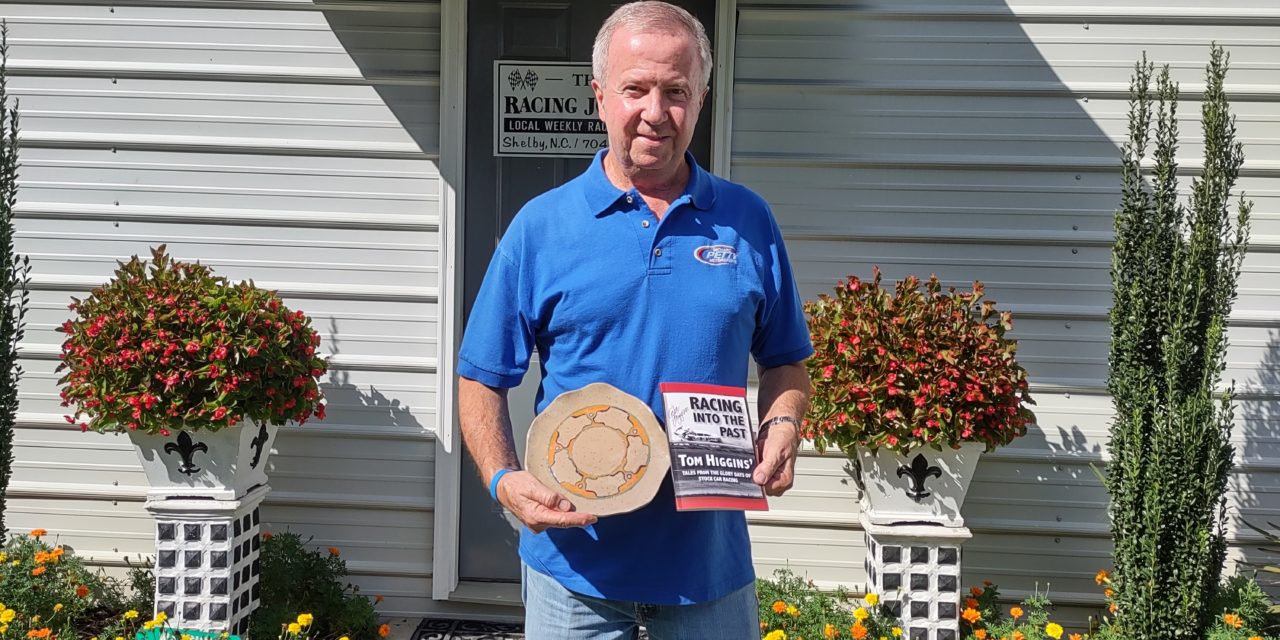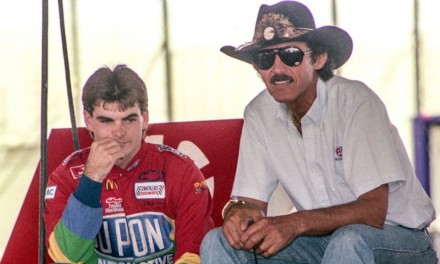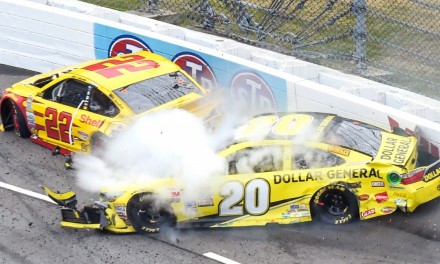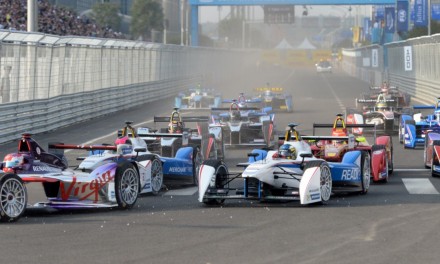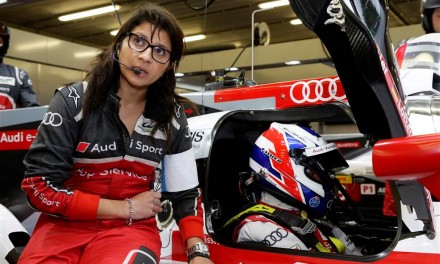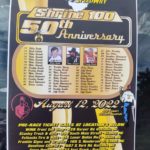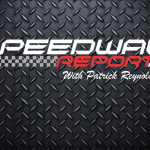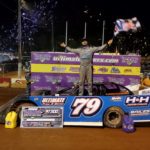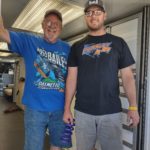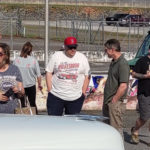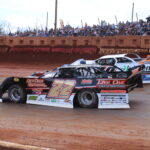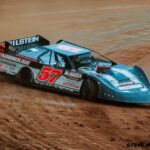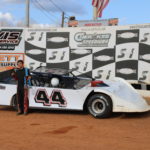Story and photo by Rhonda Beck.
Phil Combs, of Shelby, N.C. has been a part of the racing community most of his life. Roby and Irma Combs were his parents, and they were very active in NASCAR and racing’s early days. I recently visited The Combs Family Museum, which has been open to the public for three years. Combs has much information to share and answered a few questions, including about the history of the museum and his parents’ influence, his own racing career, and encounters and friendships with racers such as the late Tim Richmond and Wendell Scott.
Rhonda Beck: So Phil, your museum has been open for about three years. Would you like to say anything about all the stuff you have here and the possibility of even adding on to the museum?
Phil Combs: Well, yeah. We’ve been open three years this past Mother’s Day. The reason I opened on Mother’s Day was because I kind of built this place as a tribute to my parents and the fact that this would have never happened had it not been for my mother. My mother was the one who started collecting and saving all this stuff, mostly. I guess you could kind of call her a pack rat, but she saved cool stuff back when her and my dad worked for NASCAR for 20 years–from 1952-1972. I had tons of people through the years ask me if my dad would ever get in the NASCAR Hall of Fame. I said, ‘No, it’ll never happen because you know there are so many drivers, mechanics, crew chiefs, car owners. They’ll never get down to the officials, I don’t think.’ That’s just my personal opinion. So I had all the stuff that my mom and dad had saved from their career. I thought it’s really too cool not to display and let other people enjoy, especially the books I mentioned to you earlier. I have 150 picture books. They all have numbers on them and my mom was the one that put them together and I’ve added on to them, of course. (These are binders with each one dedicated to a particular individual driver or other person. They contain hero cards, newspaper article clippings, etc.) But to answer your question–I do plan on building on to it. As you can see, I’m kind of busting at the seams, out of room. But it’s really a good problem to have. I never would have dreamed in my wildest dreams that there are so many people interested in this place from all aspects of life. From drivers who’ve been here and just different people like race fans, its’ been pretty rewarding. I never would have dreamed I’d have this place full. I had a buddy of mine when I first built it, said, ‘Lord have mercy, why’d you build it so big?’ You’ll never fill this place up.’ So I thought, ‘Well, maybe I won’t. But I’ve had a lot of people bring me stuff. Drivers, like I said, and fans that have got memorabilia that they’ve ended up with. They may not have any friends or family that they can pass it on to and they want it to go somewhere where other people can get enjoyment out of it. That’s really, truly how I’ve got a fourth of the stuff that’s in here, for that very reason.
RB: You’re known for go-kart racing and announcing, currently at Tri County Speedway. I just saw some cool books where drivers got their careers started. You knew them when they started. Now tell me about you and your racing.
PC: Well, I started racing in 1970. I didn’t win my first race, but I won my second race, and I won my first points championship the first year. And I actually raced right across the street from where we ate lunch at today. We ate at Red Bridges Barbecue Lodge and the racetrack was right across the street from Bridges. The races were on Tuesday night of all things and I only raced there in the summertime when school was out. That’s how I got started and it went from there. I raced my very first car race in 1977 at Charlotte Motor Speedway. It was in the (NASCAR) Baby Grand series. And I’ve been very fortunate to race dirt and asphalt. I guess the highlight of my life was when I raced at Daytona in 1982 in the NASCAR Goody’s Dash race. I finished 15th out of 50 cars running there. I started announcing races in the year 2000 and I’ve been doing that for 21 years now. So even though I don’t race anymore, I’ve been involved in racing through the go-karts and tons of connections all the way back to the very first days. Even the very first race I ever raced in, the guy that won that night, Clyde Peeler, and I are still good friends to this day.
RB: And you are always up for new adventures. I saw that you were just announcing with Lenny Batycki at the monster truck event. Was that the first time with monster trucks?
PC: The first time I’ve ever done anything at Charlotte Motor Speedway and the first time I’ve really done anything like a monster truck show. It was something I really wasn’t accustomed to doing, but it was a great experience. There were thousands of people there and Lenny is such a great guy to work with. I have such a huge respect for Lenny Batycki. He’s kind of like the ‘Voice of Charlotte Motor Speedway’ and he may be at the drag strip tonight and the Legends car race tomorrow night. He’s everywhere.
RB: Yeah, like doing PRN at the Track.
PC: Yeah, he’s got so many irons in the fire; it’s just amazing. A lot of the times Lenny will contact me when he’s trying to get in touch with someone. You know, I have a great appreciation for what he does because he puts his heart and soul into it. And I kind of like to think I have a labor of love here. I’ve never charged anyone a penny for coming here. It’s all for the enjoyment of having people come in here and leave with a better feeling than they had when they got here–if that makes any sense.
RB: Yes, definitely. And do you recall any real memorable races, say at North Wilkesboro Speedway when you were growing up? I know there’s a lot of talk lately that they’d love to revitalize that track. And your dad flagged up there.
PC: Yeah, my dad flagged there for Enoch Staley (President of North Wilkesboro Speedway) for gosh, a long time. Back in the ‘60s, the early ‘60s. I was going to North Wilkesboro when I was just a little kid. You know, the neatest thing to me was when I raced in the Dash series and I actually didn’t race myself there, but I furnished a car that won a celebrity race. NASCAR contacted me. They were wanting to do a celebrity race and they were actually doing a media thing, trying to get more attention for the Dash series and they asked me would I let ‘em use my car. And I said, ‘Yes I would, if you’d let me pick out the driver.’ So it just so happened that I had a friend of mine, Mark Kessler, who was the disc jockey at Big Ways Radio in Charlotte at that time. (Kessler is now the announcer for the Washington Football Team.) We put the deal together for him to drive the car and lo and behold, he won the race. He was friends with Tim Richmond at the time and so was I. The first person he called after he won and got to a phone—this was before cell phones, remember—when he got to a pay phone, he called Tim Richmond and told him he won. So Tim invited all the pit crew and me—I didn’t get to go; I had plans that night—but all my pit crew got to go and they went to Charlotte and took the trophy and set it on the table down at Bennigan’s steakhouse and Tim bought everybody’s supper. But that was such a cool time. And North Wilkesboro racetrack. I think it will be so incredible if they can get that place back open. I think when they do, you won’t be able to buy a ticket. I think it will be like when Tony Stewart had his races (SRX series started by Ray Evernham and Tony Stewart) at all those tracks this year and every race sold out. I think that’s how North Wilkesboro will be. So many people are going to be so glad that the place is going to be opened that it’ll be a packed house.
RB: That’s awesome. You said you knew Tim Richmond? How did you meet him?
PC: Well, I actually met Tim at Wilkesboro when he was driving for DK Ulrich and this was back whenever everybody wore cowboy boots. It just so happened that he walked up beside me where I was standing at the pit wall, and I had on a pair of snakeskin cowboy boots. Well, he had on a pair of ostrich skin boots, which probably cost three times what mine cost. But he walked and said, ‘I like your boots.’ And I looked at him and I said, ‘I like them too, a whole lot better than what I’ve got.’ So that’s kind of how we struck up a conversation and ended up being good friends. It was amazing what he accomplished in a short amount of time. It’s amazing that so many people, even today, are interested in him. And I really truly think that if Tim Richmond hadn’t of died; if Alan Kulwicki hadn’t a got killed; if Davey Allison hadn’t got killed; if Ernie Ervin hadn’t got hurt–the whole record book status would’ve been different. Earnhardt wouldn’t have won seven championships. Jimmie Johnson wouldn’t have won seven championships. It would’ve been a whole different-looking NASCAR record book. But we just lost a lot of great people in a short amount of time. It’s just a shame that all that happened. But the same thing happened in 1964, and I’ve got a book right up here about 1964 when Fireball (Roberts) got burned and later died and Joe Weatherly got killed and Jimmy Pardue got killed. That was a year that was similar to the deal with Davey and all those guys.
RB: And just because it happens to be today, those that are down in Daytona, they’re honoring the Wendell Scott Family and giving them a trophy that he didn’t officially ever receive when he won the NASCAR race in 1963. Did you see him race anywhere?
PC: Oh, I did. And I’ve got a great Wendell Scott story. You know I used to sell papers when I was a kid. I sold Southern Motor Racing, Southern Motorsports Journal and Racing Pictorial Magazine and I collected decals. And we were at a race at Hickory in ‘66 and Wendell come up and I asked him if he had any decals. He said, ‘I don’t have any decals, but I’ve got a picture I’ll give you.’ So he gave me the picture that was out of Racing Pictorial Magazine. You know, I got to talk to him, and I got his autograph and that was really a cool thing for a little kid. I asked Tiny Lund the same thing. Tiny had just had a movie made about him called “Hard Charger” and he gave me the promotional picture he had, and he had a whole packet of those. Then I got Richard Petty to sign it and Bobby Isaac and Curtis Turner signed it. That’s actually what Wendell signed when I told you I got his autograph. Yeah, I’ve really been fortunate to live a cool life because of my parents. Because so many of the drivers related to me being Roby Combs’ son because he was Chief Steward and he was kind of like ‘Sheriff of the Track’ you’d say. And it couldn’t hurt matters to be buddies to Roby’s boy. A lot of guys were nice to me.
RB: You and other people have collected all this history. Do you have anything to say about more programs and podcasts that seem to be focusing on people appreciating racing history?
PC: I’ve been so fortunate, because when Dale Earnhardt Jr. did his first season of “Lost Speedways” Matt Dillner contacted me and he said, ’We’re getting ready to do a series of shows about tracks and one of the shows we’re going to do is about New Asheville Speedway.’ My dad and my mom were the only two people that worked at all three tracks in Asheville—Asheville-Weaverville, McCormick Field and New Asheville Speedway—as Track Steward and Chief Steward. So we spent a lot of time in Asheville when I was a kid. Every Friday night, actually. I made a lot of friends and you know, if you see that red book, the whole thing is about Asheville. It was an honor to be asked to be a part of the New Asheville Speedway episode of “Lost Speedways” because it was such a huge part of my early life. And I also was totally surprised when I got to be on Season 2 in the Cleveland County Fairgrounds Speedway episode.
Anyone interested in visiting the Combs Family Museum may contact Phil Combs. It is open by appointment only at this time. It is located at 833 Pleasant Drive, Shelby, NC 28152. 704-734-7690.

